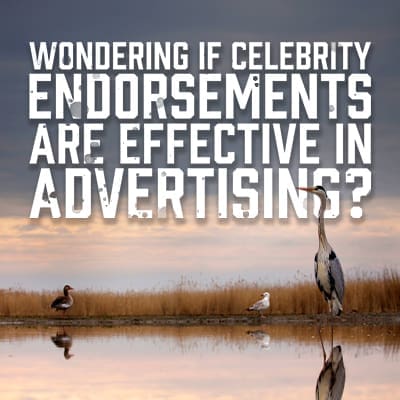 With all the hype about Taylor Swift’s recent presidential candidate endorsement, many people are wondering whether celebrity endorsements are effective. You don’t have to look far to find someone famous featured in advertising on television, in a magazine, or on a billboard with a product in hand. Social media takes this further with “influencers” who do everything from unpacking shipments live to demonstrations that illustrate a product’s benefits. These approaches leverage the star power of well-known figures to promote products or services, hoping their fame will transfer to the brand. But do these endorsements really work? Here’s a brief look at how small businesses can leverage the power of celebrity endorsements and the effectiveness of these campaigns.
With all the hype about Taylor Swift’s recent presidential candidate endorsement, many people are wondering whether celebrity endorsements are effective. You don’t have to look far to find someone famous featured in advertising on television, in a magazine, or on a billboard with a product in hand. Social media takes this further with “influencers” who do everything from unpacking shipments live to demonstrations that illustrate a product’s benefits. These approaches leverage the star power of well-known figures to promote products or services, hoping their fame will transfer to the brand. But do these endorsements really work? Here’s a brief look at how small businesses can leverage the power of celebrity endorsements and the effectiveness of these campaigns.
The Psychology Behind Celebrity Endorsements
Celebrity endorsements capitalize on the psychological principle of source credibility. This theory suggests that people are more likely to be persuaded by someone they perceive as credible and trustworthy. Due to their status, celebrities often possess a high level of perceived credibility. When a well-known figure endorses a product, it can create a positive association in the minds of consumers.
Another important psychological concept is the halo effect. This occurs when a positive impression of a celebrity transfers to the product they endorse. For instance, if a celebrity known for their success and charm endorses a product, consumers may perceive the product as more appealing or high-quality.
The Wharton School of Business conducted an intriguing experiment to explore the dynamics of celebrity endorsements. The researchers sought to determine whether featuring a celebrity in an advertisement shifted viewers’ focus away from the product and toward the celebrity’s image. Their findings were illuminating. They discovered that when a product was endorsed by a celebrity, viewers’ attention was more directed at the celebrity than the product, compared to ads featuring non-celebrities. Despite this, consumers were more inclined to choose the product associated with the celebrity over one endorsed by a non-celebrity.
Do Small Businesses Use Celebrity Endorsements?
Let’s start by addressing whether or not celebrity endorsements are relevant to small businesses in Oregon. Sure, you might not be able to pay the costs associated with having Ryan Reynolds and George Clooney in your OTT commercial. These two actors made more money from selling their jointly owned liquor brands, Aviation American Gin and Casamigos tequila, than they did from their movie deals because of their affiliation with them. While celebrities of this magnitude are likely far beyond the budget reach of your company, consider the opportunities present in your local community.
The first step for small businesses is to identify celebrities who align with their brand values and target audience. Instead of focusing solely on high-profile stars, consider local celebrities, influencers, or personalities who have a strong connection with your community or niche market. These individuals may include local TV personalities, sports figures, or social media influencers with substantial followings.
For example, small businesses can often attract attention to their products and services by featuring local sports stars. In Oregon, audiences pay attention to ads featuring Sabrina Ionescu and Justin Herbert. Check out this campaign by local fiber-optic internet provider Hunter Communications, featuring track champion Devon Allen.
Other times, you may find yourself fortunate to be the home of a well-known celebrity who has a special interest in your business or your community. When a fire tragically destroyed the historic Butte Creek Mill, Jim Belushi stepped up to host fundraising events at his nearby home to help the Mill rebuild and return to operation. While not a conventional “advertisement,” celebrities are valuable partners in helping businesses that align with their personal values to succeed.
Measuring the Effectiveness of Celebrity Endorsements
In a study conducted by Harvard Business School, researchers concluded, “This study finds validation for the use of celebrity endorsers as an advertising strategy: a firm’s decision to enlist an athlete endorser generally has a positive pay-off in brand-level sales—in an absolute sense and relative to the firm’s competitors—and increases the firm’s stock returns.” But how do you know a campaign is effective for your company?
To assess the impact of celebrity endorsements on a brand, it’s essential to track several key performance indicators (KPIs). These metrics provide valuable insights into whether the endorsement is achieving its intended objectives and delivering a solid return on investment. Here’s a closer look at how brands can measure the effectiveness of their celebrity endorsements.
1. Sales Metrics
Sales metrics are among the most direct indicators of an endorsement’s impact. By comparing sales figures before, during, and after the celebrity endorsement campaign, brands can gauge how the campaign influences consumer purchasing behavior. This involves tracking both the overall sales of the endorsed product and specific sales spikes that correlate with the timing of the endorsement.
2. Brand Awareness
Brand awareness is crucial for determining how well an endorsement enhances a brand’s visibility. Measuring shifts in brand recognition and recall through surveys and social media analytics can reveal the endorsement’s effectiveness in increasing brand visibility. Surveys can assess whether consumers have noticed the brand more frequently and whether they can recall the brand and its message better than before the campaign.
3. Consumer Perceptions
Understanding consumer perceptions is vital for evaluating how the endorsement influences attitudes towards both the brand and the celebrity. Analyzing consumer feedback through focus groups, online reviews, and social media comments can provide insights into how the endorsement is received. Brands should assess whether the celebrity’s image aligns with their brand values and whether consumers view the endorsement as authentic and credible. Positive shifts in consumer attitudes toward the brand and the celebrity can indicate a successful endorsement, while negative feedback may highlight areas for improvement.
4. Return on Investment (ROI)
Calculating the return on investment (ROI) helps determine the financial effectiveness of the endorsement. This involves comparing the total cost of the endorsement campaign—including fees paid to the celebrity, production costs, and promotional expenses—to the financial benefits gained from increased sales and brand value.
Choose Paradux Media for all your advertising needs.
Are you searching for new ways to grow your customer base and achieve increased sales? At Paradux Media, we are your local marketing experts to help you develop and implement strategies to achieve your business goals. From traditional printed materials to the latest advances in social media advertising, our team has the experience you need for marketing that gets results. Contact us today to learn more about joining our flock.
- Published: August 26, 2024
- Author: Angela Peacor
- Blog: Marketing Intelligence Report
- Category:
- Tags:
- Comments:
Quacktastic Reviews:
“The team at Paradux was wonderful to work with. Their expertise, assistance, grace, and personality were such a joy in our partnership on a video…
Always willing to work with us on our (sometimes very specific) marketing needs.
Excellent team to work with! Mike and Tisha are fantastic at coming up with new ideas while staying true to my companies vision, values, and…

Operating a restaurant and bar is hard enough. It demands wearing many hats. Promotions and marketing is not one of them any longer since we…









Can not recommend this team enough. What started as a one-time website re-design has evolved into Paradux handling the vast majority of our marketing. Business…









We would not be able to run as smoothing, quickly, or efficiently if it was not for Paradux Media Group. Tisha and team is hands…









Recently, I had the opportunity to work with Paradux Media on a website build, and I just couldn’t have been happier with the process and…









Mike and his team are well known within the region and marketing community as an insightful industry leader. If you are looking for a Marketing…









Paradux Media is a very professional group, and they know what they’re doing. Whether they are placing buys for clients, or producing high-quality TV spots,…









Paradux helped build my business in all capacities. Without them, I would never have had the resources and ability to get so much accomplished –…



















